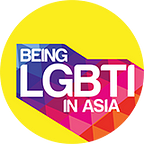Media professionals urged to join forces to counter negative portrayal of LGBTI people in Thai news
30 November 2015
Bangkok, Thailand — Media professionals must take on a greater role to counter prevalent discrimination and negative stereotypes of lesbian, gay, bisexual, transgender and intersex (LGBTI) people in Thai mainstream news coverage, heard participants at a roundtable discussion with members of the Thai news media, jointly convened by the United Nations Development Programme (UNDP) and Isra Institute.
The event, titled “Thai Society and Gender Diversity in Thai Media”, was supported by ‘Being LGBTI in Asia’, a regional initiative supported by UNDP, the Embassy of Sweden in Bangkok and the United States Agency for International Development (USAID). It brought together 25 journalists and media professionals from print, TV and online media, as well as 17 academics and civil society representatives.
“Media can become a powerful tool in tackling stigma and discrimination and a fundamental contributor to the creation of an enabling environment,” said Martin Hart-Hansen, UNDP Thailand, Deputy Resident Representative. “UNDP is committed to advocating for change and reducing inequalities and exclusion. Our ultimate goal is to achieve real improvements in people’s lives and in the choices and opportunities open to them.”
Initial findings of an ongoing study under Being LGBTI in Asia on sexual orientation, gender identity and expression (SOGIE) and intersex in the media were presented at the roundtable. The study, undertaken by Dr. Kangwang Fongkaew, Lecturer of the Department of Communication Arts at the Faculty of Humanities and Social Sciences, Burapha University, showed that there is a lack of knowledge and understanding of the LGBTI population regarding sexual orientation and gender identity among some journalists.
News media continue to perpetuate popular stereotypes of LGBTI people by portraying only a selective set of inaccurate, stereotypical characteristics. The stereotypes focus mainly on binary sexuality between masculinity and femininity in Thai sexual culture, amplifying the femininity of male-to-female transgender persons or the masculinity of lesbian ‘tomboys’. The study is expected to be completed and published in early 2016.
A panel discussion joined by civil society, academics and media practitioners analyzed the role of the media in creating a more open and embracing society towards sexual and gender minorities. A break-out session provided an opportunity for participants to work together to identify challenges and opportunities towards producing more accurate and neutral reporting that counters stereotyping, stigmatization and discrimination of LGBTI people in the media.
At the end of the event, a SOGIE and intersex media fellowship programme was announced to provide an opportunity for journalists to become sensitized to the issues and support more balanced, supportive reporting. The ultimate goal is to establish a network of media professionals receptive to positively engaging with and advocating on LGBTI issues. The deadline of the application for the media fellowship is 28 December 2015. For more information, download the concept note.
Contact:
Suparnee Pongruengphant (Jay), National Project Officer on Governance, Human Rights and LGBTI at:
Tel: 02–304 9100 Ext. 1746
Email: suparnee.pongruengphant@undp.org
